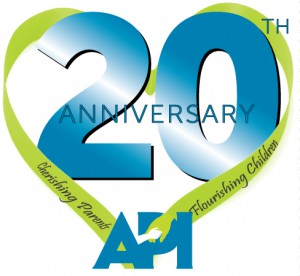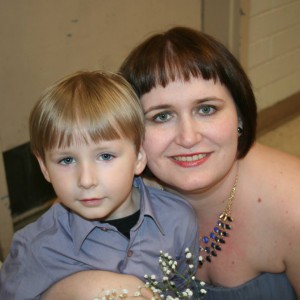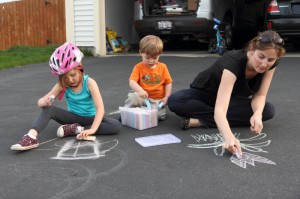 In celebration of Attachment Parenting International’s 20th Anniversary, this second of the two-part “Generation AP” series (read the first part here) continues to recognize today’s second-generation Attachment Parenting parents:
In celebration of Attachment Parenting International’s 20th Anniversary, this second of the two-part “Generation AP” series (read the first part here) continues to recognize today’s second-generation Attachment Parenting parents:
“I like how my parents approached parenting. They never did anything to hurt us. They always did whatever they did out of love or with the best intentions. I don’t think there’s much to improve upon. I just hope I can be like them. “ ~Autumn McCarthy
For some parents, Attachment Parenting is a whole, new frontier of relating within the family. We are learning from the ground up. For others, Attachment Parenting (AP) comes as naturally as breathing. That’s how it was for Autumn McCarthy of Plano, Texas, USA, the API Leader of Collin County API in Dallas-Fort Worth, Texas, and a second-generation AP parent. Additionally, she is a licensed clinic social worker, personal life coach and a La Leche League leader.
RITA: Thank you, Autumn, for your time. Let’s start by reviewing how your parents practiced AP.
AUTUMN: My parents have six living children. They practiced Attachment Parenting by having the family bed, breastfeeding, babywearing and practicing gentle discipline. They also pretty much took us with them wherever they went. They included us in whatever they had to do.
RITA: It sounds like your parents used many of the techniques associated with AP. How did your parents help you through strong emotions like anger and disappointment?
AUTUMN: They let my emotions be my own. They didn’t react. They didn’t take things personally. They let me express myself even if I wasn’t doing it in the “right” way or the healthiest way or the least destructive way.
I remember once telling my parents, “F*** YOU!” at age 15 right after my grandfather died. Crazy times! And they recognized it for what it was: a teenager full of crazy emotions not knowing how to express them. They didn’t flip out at me for being super disrespectful. They helped me to understand and express myself better.
RITA: That’s a wonderful example of allowing, empathizing and validating your emotions and then coaching and empowering you to be able to learn from the experience. Did you ever feel that the way your parents were raising you was different than how your peers were raised?
 AUTUMN: I knew from an early age that my parents raised me and my siblings differently from other parents. One of the most interesting things to me was seeing how my parents handled us growing up and turning 18 versus other parents.
AUTUMN: I knew from an early age that my parents raised me and my siblings differently from other parents. One of the most interesting things to me was seeing how my parents handled us growing up and turning 18 versus other parents.
I’d say, growing up, my parents were stricter in some areas. There were just more rules or expectations, like we weren’t allowed to spend the night at just anywhere. I think there were maybe two friends in all of growing up that I could stay the night with. But then as we got older, my parents really believed that we were able to be independent and that, although there was an expectation for mutual respect especially while living in the same house, there weren’t additional rules. Once we turned 18, we were considered adults and treated as such—trusted by my parents.
My friends tended to have a little more flexibility growing up—less rules—and then the second they turned 18, it was like their parents got super strict, placed a ton of rules on them like when and where they could go, when they had to be home, etc. Hanging on for dear life to their kid while my parents happily watched us independently fly on our own.
RITA: That’s an interesting observation. So did you find it natural to practice AP when you became a parent?
AUTUMN: Yes! When I was pregnant and working, I kept negotiating with myself and my husband for how much time I could stay home. I kept increasing the time line: “If he’s been with me, growing inside me, for 9 months, it would be crazy to not be with him for just as long once he’s born!” On paper, there was no way my staying at home could work, but it has worked in a practical way for almost four years. It hasn’t been easy, but the confidence in knowing I am meant to be right here with him has helped tremendously with the decision.
Attachment Parenting has been mostly intuitive for me. Being with my baby, feeding my baby from my breast despite the troubles I initially had, providing care based on his cues and needs. Attachment Parenting has so many parts to it, and it can look so many ways. For us, this has meant bedsharing, breastfeeding and trusting my son when he “tells” us what he needs from us.
The gentle discipline part is the most challenging for me.
RITA: How so?
AUTUMN: Gentle discipline is a challenge for me. I think I’m my own worst critic, of course.
We do gentle discipline, but I find it a challenge to not yell. We mess up all the time and apologize and explain what we did wrong and how we should have done it differently. I am trying to express my feelings and name my emotions for him. He’s now been able to do the same when he’s upset.
It’s a challenge for sure, and I wouldn’t want to use any other type of discipline. I just judge myself and whether I could have been better, more gentle.
RITA: Many parents feel they need to improve upon how they were parented in some way, but it sounds to me like how you were raised didn’t leave you with that impression?
AUTUMN: My son is almost 4. I feel like so far I’m parenting much like my parents did. Looking at all of us now, I can only hope that I parent Noah in such a way that he has a relationship similar to what my siblings and I have with my parents.
I think my parents did the best they could. I don’t think it was always right or necessarily wrong. It just was what it was. I see that now as a parent myself. Sometimes I mess up. Sometimes I could have done it better or differently, but it doesn’t mean I did it right or wrong in that moment.
I like how my parents approached parenting. They never did anything to hurt us. They always did whatever they did out of love or with the best intentions. I don’t think there’s much to improve upon. I just hope I can be like them.
RITA: Do you receive a lot of support from your parents?
AUTUMN: Yes! My parents are some of my biggest support people. They love seeing us raise Noah in a similar way to how they parented. They feel it is so beneficial to the child, so they are happy to see their grandchild benefitting from us raising him in this way!
RITA: And what about your partner—what does he think about AP?
AUTUMN: My husband did not grow up with Attachment Parenting. It was a new concept to him when we had our son.
My husband has been supportive of Attachment Parenting. He has seen the benefits to it for not only our son, but for us, too. When Noah was 1 1/2 years old, our wedding anniversary was coming up, and I told my husband that we should get a friend to watch him at our house so we could run up to dinner nearby or something. My husband replied, “No, that’s OK. I don’t see why we can’t just celebrate with him.” I had to laugh—my husband had become an AP parent!
My in-laws have been respectful of our parenting decisions even though the way we parent differs from the way they parented. We have addressed some of these differences by explaining why we parent the way we do and what would be most helpful to us in terms of ways to support our attached family.
RITA: Thank you, Autumn, for your insights. Parenting is such a journey, and I think every parent—no matter how experienced—is always learning. Plus, children are constantly changing and some development changes are harder or easier for some parents than others. How do you feel about parents who struggle with AP?
AUTUMN: In my experience, I find parents who are struggling are either basing Attachment Parenting off of misinformation of what it is or are putting too much pressure on themselves. Usually, they have an idea of what AP is and it’s usually a very defined, very specific picture of parenting.
I feel compassion and love for parents who are struggling with AP or anything else for that matter. I am a parent that struggles on a daily basis to parent my child how I want to. I think it’s part of parenting regardless of the type of parenting one follows. I will usually try to offer a different perspective or a tip or tools to try if they are open to ideas.
Parenting is hard, period.

